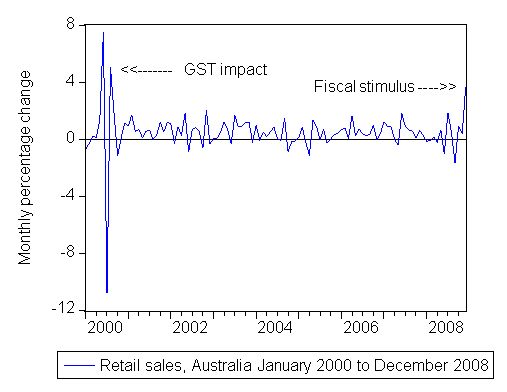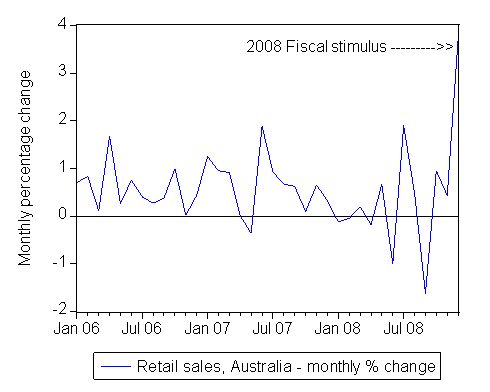I started my undergraduate studies in economics in the late 1970s after starting out as…
Fiscal stimulus effects …
Opposition leader Turnbull has decided to go to the wall in opposing the $42 billion package. In particular, they want tax cuts rather than the $12.7 billion in cash handouts. He said they will not be provide economic stimulus and that December’s $10.4 billion in handouts had not worked. Soon after Turnbull provided these conclusions the ABS released the latest retail trade figures which showed that consumer spending shot up by 3.8 per cent in December, the highest monthly increase since August 2000 (since the GST came in).
I prepared two interesting graphs today in my moments of musing which give you some idea of how special the December quarter 2008 was in the time series history of retail sales. Graph one shows the monthly percentage change in Retail Sales for Australia from January 2000 to December 2008. Two events stand out starkly. The impact of the GST which began in July 1, 2000. In June 2000, retail sales shot up by an astounding 7.52 per cent on the previous month as consumers brought forward purchases to avoid the GST. To get some perspective, the average for the period April 1982 to December 2008 which is the entire sample available for download from the ABS was 0.54 per cent growth per month.
In July 2000, as the GST began operation, retail sales slumped by 10.74 per cent (that is a huge negative decline). They recovered somewhat in August 2000 (5.11 per cent) as consumers reacted to sales and adjusted purchases again. Thereafter monthly growth in retail sales was relatively clustered around the mean value. That is, until December 2008 when the $10 billion fiscal stimulus put extra purchasing power into the economy. As noted above, retail sales shot up by 3.8 per cent for that month, far above recent history and far above the long-term average. This average is probably a reasonable characterisation of behaviour because there does not seem to be any large “mean shifts” in the data – just a couple of major policy events noted above.
The second graph focuses more on the recent period from January 2006 to December 2008. The average monthly growth over this period was 0.56 per cent per month (which is close to the long-run average). The sharp upward spike in December 2008 is clear.
Unless someone can come up with an extra-terrestial explanation for this abnormal behaviour I am content to use my theoretical knowledge and practical experience and conclude that the fiscal stimulus worked!.
Other senior liberals also talked about the December stimulus overnight. When asked about the ABS retail trade figures, the Shadow Treasurer, Julie Bishop offered this nonsense to the ABC PM programme:
The figures show that the seasonally adjusted sales increased by $700-million from November to December. The point we make is it was a $9-billion – $10-billion cash stimulus that was handed out last year. Clearly it wasn’t spent to the expectations of the Government. Clearly, it will not stimulate the economy and clearly it will not create new jobs.
To which ABS PM Presenter Mark Colvin said:
But clearly it did stimulate the economy to a degree. There was no pre-Christmas slump and as I say quite a lot of people kept their jobs as a result of that didn’t they?
To which the Shadow Treasurer said:
And what happened to the other about 8.9, nearly $9-billion of that cash package – what happened to that? Well, presumably it was saved. And we can understand why Australian people would do that but the point is cash handouts, however attractive they might be to Australian people, do not achieve the desired outcome of a fiscal stimulus package. That is boosting the economy and creating new jobs and that is…
The sheer idiocy of her remarks is stunning given that she aspires to managing fiscal policy in Australia.
Some say a return to failed politician Peter Costello will revitalise the opposition leadership. Well this is what he said about the December stimulus yesterday in the Fairfax press:
Late last year the Government delivered more than $10 billion (1 per cent of GDP, 4 per cent of Commonwealth outlays) to pensioners and families and asked them to spend it before Christmas. Many didn’t. Very sensibly, they thought they should pay off some debt or put away something for the future. The Government urged them to spend it all at once so it could massage the retail figures in the December national accounts … Now we are in the March quarter and there is nothing lasting to show for that money.
The ABS retail trade figures for December show that in that quarter something special happened and the fiscal stimulus was the “only show in town”.
But I also want to comment on this recurring theme that giving people money will not stimulate the economy because they will save some of it or pay of debts. First, it is true that people will use the funds to restructure their balance sheets (pay off debt; create some net assets; save etc). That is a good thing given how precarious the household sector is with respect to its debt holdings. This reduces their vulnerability to losing their homes and enables the households to better withstand any possible (and likely) joblessness.
Second, this also establishes a fundamental point about how monetary economies operate. Budget deficits provide the funds for the non-government sector to build assets and net save. Public deficits finance private surpluses. When the government runs persistent surpluses, they squeeze private savings and wealth. If they persist for long enough you see the situation we are in now – which is a fundamental cause of the crisis – the non-government sector dissaves overall and experiences wealth reductions.
Third, if people did save a proportion of the injection – good – and what it means is that the Government’s stimulus was not large enough – that is, in terms of the spending gap that must be filled to maintain existing employment levels (and further create new jobs to soak up the huge pools of underutilised labour already existing). It means that the next stimulus has to be that much larger.
There is no problem with that. It is just what the Federal government as the monopoly issuer of the currency should be doing by way of responsible fiscal management.


Hi Bill… I heard you speaking on Radio national today and just wanted to say that I have been feeling the same about the employment situation for so long and it is great to hear someone intelligent enough and brave enough to speak out. I have struggled with employment/money/Centrelink most of my life {being a very moderately successful musician}nd I really know the value of being able to give to others in your society… and feel valued financially and otherwise.Such work as you were suggesting though comparatively low paid will often be of much more worth than the financial gain.Bye… Cleis
Dear Cleis, Thanks for your comment. As a musician myself I understand the industry you are struggling in well and the interaction that many musicians have to have with the welfare system. If I was the Federal Government I would offer all musicians (artists, actors etc) a Job Guarantee job at minimum wage (which is much more than most players make anyway given the extreme exploitation that occurs in that labour market). In return the bands could play their gigs with the certainty that they had a steady income but I would also require them to conduct rehearsals in schools to advance musical appreciation in our society; play some concerts in old peoples homes; etc. The aged rock as well as the young! A guaranteed job and some return back to the community. Win, Win.
I think we have to rethink what constitutes productive work and support creative solutions to community development.
all the best
bill